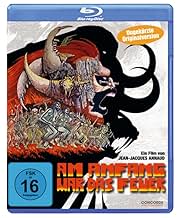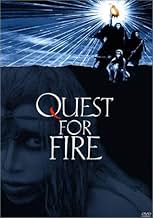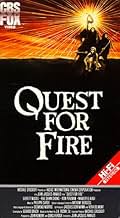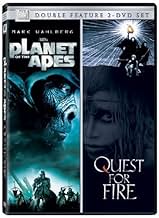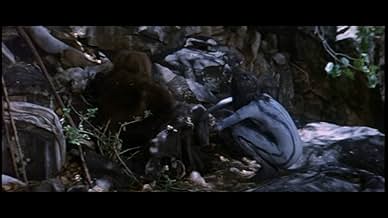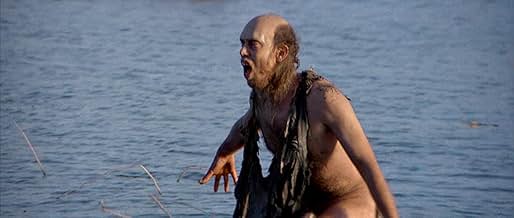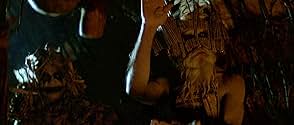IMDb रेटिंग
7.3/10
25 हज़ार
आपकी रेटिंग
अपनी भाषा में प्लॉट जोड़ेंThis story takes place in prehistoric time when three tribesmen search for a new fire source.This story takes place in prehistoric time when three tribesmen search for a new fire source.This story takes place in prehistoric time when three tribesmen search for a new fire source.
- निर्देशक
- लेखक
- स्टार
- 1 ऑस्कर जीते
- 11 जीत और कुल 8 नामांकन
Nicholas Kadi
- Gaw
- (as Nameer El-Kadi)
Franck-Olivier Bonnet
- Aghoo - The Ulam Tribe
- (as Frank Olivier Bonnet)
Joy Boushel
- The Ulam Tribe
- (as Joy Boushell)
फ़ीचर्ड समीक्षाएं
This is an extremely overlooked film many people should learn about. First, it tells you a very complex story without a single line of dialog successfully.
Second, the story is universal: Every civilization on earth can pick up this film and understand it, because it goes to the most basic, primitive issues of a species (mainly, survival). Third, it makes the beginning of man interesting. Fourth, it reminds us we were once as savage as any other animal on earth.
Fifth, it's like no other movie you've seen before. That one I can guarantee you.
Second, the story is universal: Every civilization on earth can pick up this film and understand it, because it goes to the most basic, primitive issues of a species (mainly, survival). Third, it makes the beginning of man interesting. Fourth, it reminds us we were once as savage as any other animal on earth.
Fifth, it's like no other movie you've seen before. That one I can guarantee you.
I caught this in Boston back in 1981. They played it in the biggest cinema they had in 70mm and in stereo sound. I had only the slightest idea of what it was about but it sounded interesting. When I realized it was a caveman movie I almost left, but the beautiful wide screen cinematography kept me in my seat. Slowly it worked on me and by the end I was mesmerized.
There's not really much of a plot--the caveman discover fire and different sexual positions--and there's no dialogue that we could understand but it didn't matter. The whole cast was excellent--especially Ron Perelman and Rae Dawn Chong (who had guts to do this). Their whole performances had to be done using some foreign language and body movement but they pulled it off. I heard Anthony Burgess was called in to develop the language used and coach the cast in how to use it. The cinematography is just breath-taking and the prehistoric animals look realistic all the way. I can't exactly say why I loved this movie but I did.
20th Century Fox deserves credit for actually acquiring the film and releasing it. Naturally it bombed badly here in the US but it seems I'm not the only one who likes it--when I mention it to friends I just get a blank look back. I haven't seen it since 1981 but it's never left me. Try to see it on a big screen TV. I give it an 8.
There's not really much of a plot--the caveman discover fire and different sexual positions--and there's no dialogue that we could understand but it didn't matter. The whole cast was excellent--especially Ron Perelman and Rae Dawn Chong (who had guts to do this). Their whole performances had to be done using some foreign language and body movement but they pulled it off. I heard Anthony Burgess was called in to develop the language used and coach the cast in how to use it. The cinematography is just breath-taking and the prehistoric animals look realistic all the way. I can't exactly say why I loved this movie but I did.
20th Century Fox deserves credit for actually acquiring the film and releasing it. Naturally it bombed badly here in the US but it seems I'm not the only one who likes it--when I mention it to friends I just get a blank look back. I haven't seen it since 1981 but it's never left me. Try to see it on a big screen TV. I give it an 8.
I recall when this film was released. If memory serves, the hype concerned the efforts to turn an elephant into a mastodon using make-up and an actress running around nude. In other words, the film in my mind fell into the 'One Million Year BC' category and I ignored it.
Later, I learned who Annaud was and admired 'The Name of the Rose' for its direction, its translation of a difficult book and its effort at realism. Finally, I rented 'Quest for Fire' on DVD and saw it on the big home screen. (In fact, I watched it several months ago and I'm commenting now because it remains in my mind.)
Experts can quibble about the realism. But for me, this film makes an intelligent and credible effort to present a world of 80,000 years ago. In this, it raises good questions about who we are as a species. Human genetic code has not changed in that time and any one of the beings portrayed would be perfectly capable of using a computer as I'm doing now. Nonetheless, they lived in a world without numbers, without prices, without trade, without written language and without means to create fire. Everyone alive today had an ancestor who survived those conditions. 'Quest for Fire' is a must-see for anyone curious about the human condition.
Later, I learned who Annaud was and admired 'The Name of the Rose' for its direction, its translation of a difficult book and its effort at realism. Finally, I rented 'Quest for Fire' on DVD and saw it on the big home screen. (In fact, I watched it several months ago and I'm commenting now because it remains in my mind.)
Experts can quibble about the realism. But for me, this film makes an intelligent and credible effort to present a world of 80,000 years ago. In this, it raises good questions about who we are as a species. Human genetic code has not changed in that time and any one of the beings portrayed would be perfectly capable of using a computer as I'm doing now. Nonetheless, they lived in a world without numbers, without prices, without trade, without written language and without means to create fire. Everyone alive today had an ancestor who survived those conditions. 'Quest for Fire' is a must-see for anyone curious about the human condition.
Stanley Kubrick's classic "2001" celebrates the first weapon, when a hairy primate through some burst of savage genius turns a useless thigh-bone into a dominating club. He thereby takes a giant first step in humanity's long pursuit of bigger and better weapons. On the other hand, "Quest for Fire" dramatizes humanity's other side: the civilizing arrival of the campfire. But not just any campfire; instead it's the security found in mastering the technique to make fire any time the tribe wants. As a result, the Cro-Magnons have for the first time some control over their environment and can take time to relax. That's made apparent at film's end when the clan gathers happily around crackling embers to relate stories through crude gestures and grunts. Perhaps the evolution of complex linguistic forms had its origins in just such relaxed moments, when imagination and thinking could take hold and get expression in the company of others.
There's also that overlooked moment when Naoh humbly approaches the lordly herd of marauding mastodons. Tufts of grass in hand, he bows his head in an unmistakable gesture of submission, to which the herd responds-- not very plausibly --by chasing away the attacking cannibal clan. The point here is that Naoh understands in that quiet moment that we must live humbly with those forces much greater than ourselves if we want to survive-- a possible seed of what would later become religious belief, whether in the forces of nature or in the supposed power of the supernatural.
Of course, this is all speculation. The filmmakers don't exactly hit you over the head with their messages. However, the point is that the film succeeds admirably in getting you to think about the natural history of what these lowly but momentous origins must have been like. Moreover, there are other suggestive moments, such as when the camera transitions from Rae Dawn Chong's pregnant belly to the distant full moon and humanity's far-off future. Some reviewers point out scientific flaws in the script and reject the film on that basis. But that misses the point. Of course the film is not a documentary, so no serious researcher would base a study on it. Nonetheless, the movie remains just that, a well-staged and provocative ninety minutes of unusual filmmaking. I've seen nothing like it before or since.
There's also that overlooked moment when Naoh humbly approaches the lordly herd of marauding mastodons. Tufts of grass in hand, he bows his head in an unmistakable gesture of submission, to which the herd responds-- not very plausibly --by chasing away the attacking cannibal clan. The point here is that Naoh understands in that quiet moment that we must live humbly with those forces much greater than ourselves if we want to survive-- a possible seed of what would later become religious belief, whether in the forces of nature or in the supposed power of the supernatural.
Of course, this is all speculation. The filmmakers don't exactly hit you over the head with their messages. However, the point is that the film succeeds admirably in getting you to think about the natural history of what these lowly but momentous origins must have been like. Moreover, there are other suggestive moments, such as when the camera transitions from Rae Dawn Chong's pregnant belly to the distant full moon and humanity's far-off future. Some reviewers point out scientific flaws in the script and reject the film on that basis. But that misses the point. Of course the film is not a documentary, so no serious researcher would base a study on it. Nonetheless, the movie remains just that, a well-staged and provocative ninety minutes of unusual filmmaking. I've seen nothing like it before or since.
Much has been said about the movie and all I want to add is what I think are the two best scenes in the movie. The first is when the clay covered tribe member took Naoh into the cave and showed him how to make fire by friction. The look on Naoh's face could not express more wonder if he had pulled a buffalo out of his ear. The second scene was after they returned to their own tribe and tried to narrate to the rest of their tribe the things that they had seen along the way, seemingly inventing language as they went.
क्या आपको पता है
- ट्रिवियाBoth Ron Perlman and Everett McGill suffered frostbite; luckily they were able to heal completely. Despite the working conditions, they both enjoyed making the film.
- गूफ़The movie is set 80,000 years ago, and appears to show the one tribe has made pottery. Fragments of ancient pottery found in southern China date back to only 20,000 years, making them the world's oldest known pottery. However, the vessel shown is actually a dried hollow gourd.
- भाव
[first lines]
Title Card: 80,000 years ago, man's survival in a vast uncharted land depended on the possession of fire. / For those early humans, fire was an object of great mystery, since no one had mastered its creation. Fire had to be stolen from nature, it had to be kept alive - sheltered from wind and rain, guarded from rival tribes. / Fire was a symbol of power and a means of survival. The tribe who possessed fire, possessed life.
- इसके अलावा अन्य वर्जनAll UK versions are cut by 8 secs and are missing a shot of a wolf on fire.
- कनेक्शनFeatured in À propos de 'La guerre du feu' (1981)
टॉप पसंद
रेटिंग देने के लिए साइन-इन करें और वैयक्तिकृत सुझावों के लिए वॉचलिस्ट करें
- How long is Quest for Fire?Alexa द्वारा संचालित
विवरण
- रिलीज़ की तारीख़
- कंट्री ऑफ़ ओरिजिन
- भाषाएं
- इस रूप में भी जाना जाता है
- Quest for Fire
- फ़िल्माने की जगहें
- उत्पादन कंपनियां
- IMDbPro पर और कंपनी क्रेडिट देखें
बॉक्स ऑफ़िस
- बजट
- $1,25,00,000(अनुमानित)
- US और कनाडा में सकल
- $2,09,59,585
- दुनिया भर में सकल
- $2,09,62,615
- चलने की अवधि1 घंटा 40 मिनट
- रंग
- पक्ष अनुपात
- 2.35 : 1
इस पेज में योगदान दें
किसी बदलाव का सुझाव दें या अनुपलब्ध कॉन्टेंट जोड़ें



![Bande-annonce [OV]](https://m.media-amazon.com/images/M/MV5BZTg3YWU0MTMtMDk1Mi00M2Y4LWFiODgtYzFhOTAyMWRjYWY2XkEyXkFqcGdeQXRyYW5zY29kZS13b3JrZmxvdw@@._V1_QL75_UY281_CR74)
